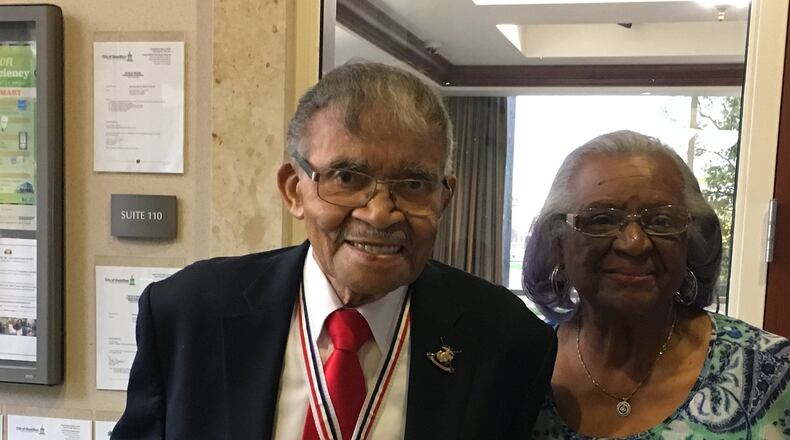Watson, who chose the Marine Corps as his branch and rose to the rank of corporal, served in the Montford Point Marines from Nov. 1, 1943 until his honorable discharge on May 11, 1946. That trailblazing group of Marines, the first African-Americans in that service, was segregated from white counterparts, undergoing boot camp training at the swampy area of land known as Montford P0int Camp in North Carolina.
“Montford Point veterans are legends in the rich history of the Marine Corps,” according to the certificate of recognition Watson received, signed by James F. Amos, 35th Commandant of the Marine Corps, with his Congressional Gold Medal. “Choosing to put their lives on the line in service to the nation, they advanced the cause of civil rights and contributed to President Truman’s decision to desegregate the Armed Forces in 1948.”
The Montford Point Marines served with distinction during some of World War II’s “most challenging struggles” in the Pacific, according to the certificate that accompanied the highest expression of national appreciation.
The certificate also noted the nearly 20,000 African-American men in the Montford group faced “harsh contradictions” between fighting overseas for their country to protect democracy and then returning to face “the denial of civil rights at home.”
“I was very proud to be a Marine,” Watson said in an interview with the Journal-News. “Segregation is never a good feeling. We knew we had to bear up with it, because that’s the only choice we had. So we just decided to buckle down and do whatever we had to do, to do our job.”
“Mainly, after we got into boot camp, we were just there trying to become good Marines. That’s all we thought about,” he said.
When Watson, now 92, entered the Marines, his home address was on S. Second Street. The 1943 Hamilton High School graduate, and son of Paul and Anestine Watson, lived several places in Hamilton. He now lives in the Village of Woodlawn in Hamilton County, but still attends church at Bethel Baptist Church in Hamilton.
He served with the 4th Marine Ammunition Company, which boarded a tank landing ship and headed for the battle of the Mariana Islands, involving Saipan, Guam and Tinian. The company landed on Guam on July 21, 1944 and fought Japanese forces in an intense battle that ended Aug. 10, 1944.
Mayor Pat Moeller, during a recent city council meeting, said Watson had been so proud of his military service that he “proudly walked the streets of your neighborhood,” uniform on, in the Second Ward. “What a proud, proud Marine you were to do that, and words and signs can’t express enough (gratitude) to trailblazers like you.”
After his service, Watson attended Miami University, where he took engineering courses, before attending the University of Cincinnati’s evening college for 15 years. He worked many years at General Electric, first as a lab technician. He ultimately became one of Ohio’s first licensed engineers, and then became a manager over other engineers, before retiring in 1987 after decades of working there.
He will be married to his wife, Annacille (Robinson) Watson, 70 years in December.
Bethel Baptist Church Pastor James Wynn III praised Watson’s drive: “Mr. Watson has done a number of things in our church as well as the community. He’s an outstanding citizen, wonderful church member, speaks his mind clearly.”
Hamilton Public Works Director James Williams, who served as a Marine first lieutenant, said, “I’ve known now three Montford Point Marines since I’ve been a Marine, and they, due to the time frame of the segregation in this country, were put through just an incredible amount of vetting and scrutiny, associated with being combatants in service for this country.”
There was concern, early in the 20th century, about “the ability of African-Americans to fight,” Williams said. “And the Montford Point Marines, due to their illustrious battles in World War II, changed that perception.”
The Department of Defense later allowed African-Americans to become officers, allowing Williams himself to become a Marine officer, serving during the Persian Gulf War.
“I’m very proud,” said Watson’s daughter Roberta Renfro, of Denver, who called her father, “a great example of persistence.”
“I’m proud of my husband,” said Annacille Watson. “He worked so hard for this, and I’m so proud.”
About the Author
